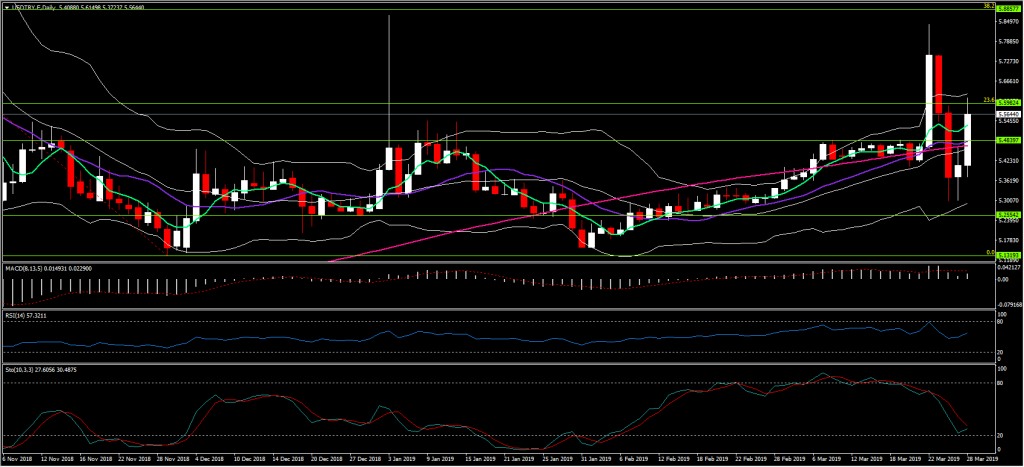Almost six months after the rate hike which pushed Turkish interest rates to 24%, the Turkish Central Bank wants local banks to use one of two more expensive funding windows, standing at 25.5% and 27% respectively, as it suspended one-week repo auctions for an unspecified period, as it announced on March 22. The announcement came less than a year after the Central Bank said one-week repos would be its main funding tool.
The Lira slumped at the announcement, dropping 2,800 pips on the day. While the Lira recovered in the next couple of days, there are still signs of weakening, as the USDTRY has been on rally since the first days of February, gaining approximately 5% year-to-date.
Signs of economic deterioration can be found in the country’s data announcements, with a contraction of 3% recorded in 2018Q4. Despite registering growth for the year, mainly based on the first two quarters’ performance, and even though the Finance Minister commented that the country has left the worst behind, recent data releases have not been good: the average unemployment rate increased to 13.5% from 12.3%, Retail Sales are down 6.7% y/y, and the state budget balance recorded a 16.8 Billion deficit compared to a 5.1 Billion surplus in January. Most importantly, the March CPI release on April 3 sees expectations of a rise to 19.9%, compared to 19.67% in February.
In the banking sector, things are not doing so well either. As a result of the depreciation, FX deposits increased by 45% y/y, of which 11.9% took place since the beginning of the year. This increase is due to have caused a further depreciation of the Lira, especially considering that resident deposits in TRY are declining. The depreciation caused a major part of the 34% increase in FX loans, while loans in TRY increased marginally. Non-performing loans are also up 39%, reaching 5.3% of total loans, compared to 3.9% a year ago for Deposit Banks.
As commented back in August, the Turkish crisis reflects endemic factors, the first being the country’s high dependence on external financing, which appears to have been waning as foreign investors are either pulling out or rethinking investments in the country. This became evident last week as the Central Bank’s international reserves declined by $6.3 billion, to $28.5 billion, or $2.5 billion more than the expected foreign debt repayments, hinting that these funds may have been used to stabilize the currency. As Black Monday showed, forcing the Bank of England to learn fast and the hard way, Central Banks cannot go against the market for a long time. Thus, it is not at all surprising that investment banks such as JP Morgan set the target for the Turkish Lira at 5.90 stating that the pace of FX reserve reductions will be unsustainable.
The second endemic factor is none other than the political situation. Recep Tayyip Erdogan is running the country with an iron fist, going as far as probing JP Morgan for its statements, and warning other investors against predicting that the Lira would weaken. Municipal elections on Sunday could turn the tables on Erdogan, who hopes for a win which will allow him to deal more with restoring foreign confidence. However, Erdogan’s usually arrogant stance has put more pressure on the country, with the CDS on the 5-year bond rising to more than 460 bps, a 50% increase from mid-March.
In a nutshell, all of the above continue to weigh negatively on the economy, with the government likely to increase spending in order to prevent further deterioration. However, given that the economic situation in Turkey is more linked to political developments than ever, it would take a big turn in country’s approach to foreigners in order to satisfy the markets.
Technically, USDTRY just moved past its 200DMA at 5.47 and is trading north of the weak 5.484 Resistance point. Strong Resistance is at 5.60 (Fib. 23.6%), with the next coming at 5.88 (Fib. 38.2%), close to the JP Morgan level of 5.90. Indicators are also showing signs of a rise, as Stochastics appear to have bottomed.
Click here to access the Economic Calendar
Dr Nektarios Michail
Market Analyst
Disclaimer: This material is provided as a general marketing communication for information purposes only and does not constitute an independent investment research. Nothing in this communication contains, or should be considered as containing, an investment advice or an investment recommendation or a solicitation for the purpose of buying or selling of any financial instrument. All information provided is gathered from reputable sources and any information containing an indication of past performance is not a guarantee or reliable indicator of future performance. Users acknowledge that any investment in FX and CFDs products is characterized by a certain degree of uncertainty and that any investment of this nature involves a high level of risk for which the users are solely responsible and liable. We assume no liability for any loss arising from any investment made based on the information provided in this communication. This communication must not be reproduced or further distributed without our prior written permission.




















